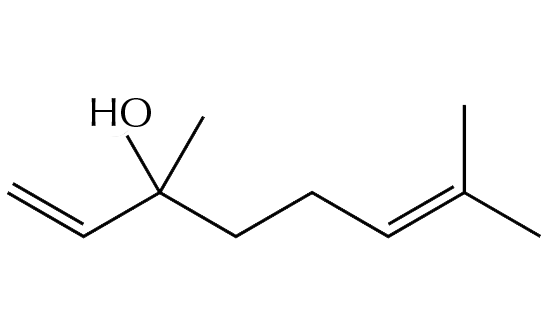What Is Linalool?
Linalool is a naturally derived ingredient from essential oils that is used in skincare and cosmetic formulations to improve the scent. Linalool is generally associated with lavender however, over 200 plants produce linalool and it can also be found in citrus, mint, rosewood, and cinnamon oils.
Linalool is a naturally occurring terpene found in a wide variety of flowers and spice plants. Terpenes are a large and diverse class of organic compounds produced by a variety of plants. They often have a strong scent and may protect the plants that produce them by deterring herbivores and by attracting predators and parasites of herbivores.
Linalool is surrounded by some controversy over its use in skincare and cosmetic formulations. It is considered to be a highly sensitizing ingredient that may disrupt the skin’s natural barrier. As such it is generally recommended that sensitive or irritated skin types avoid this ingredient.

Linalool
the good:Linalool helps to improve the scent and taste of cosmetic and skincare formulations. It may also have added benefits, acting as an anti-stress and soothing ingredient.
the not so good:It can cause sensitivity and irritation, particularly in sensitive skin types.
Who is it for?All skin types except those that have an identified allergy to it.
Synergetic ingredients:Works well with most ingredients.
Keep an eye on:Keep in mind that the research into its ability to act as an anti-stress ingredient and anti-inflammatory are relatively new and more research needs to be conducted before any changes in its approved uses can be made.
Why Is Linalool Used?
Linalool functions as a fragrance ingredient in cosmetics and skincare products. Linalool is also suspected to be beneficial as an anti-anxiety support and a potential anti-inflammatory.
Anti-anxiety
Linalool is also found in many essential oils. Many of the essential oils in which linalool is found are being studied for their potential anti-anxiety, sedative, and anti-inflammatory effects. In a study investigating the anti-anxiety effects, rats that were injected with linalool showed a significant decrease in muscular activity when compared with rats that were not. While this study did not prove anti-anxiety effects, the results did suggest that linalool may help with sedation and muscle relaxation.
Anti-inflammatory
Linalool may also have anti-inflammatory properties. A 2002 study published in the scholarly journal Phytomedicine examined the anti-inflammatory activity of linalool, as well as linalyl acetate, the acetate ester of linalool. The study found that both linalool and linalyl acetate play a major role in the anti-inflammatory activity displayed by the essential oils containing them, and provide further evidence suggesting that linalool and linalyl acetate-producing species are potentially anti-inflammatory agents.
Of note, linalool can only act as an anti-inflammatory agent in its natural form and not when it is synthetically produced. If you are wanting to explore the benefits of linalool be mindful that some brands will use the synthetic form for the scent.
Insect repellant
In addition, to use as a fragrance, linalool is often used as an insect repellent in natural formulations. However, the EPA notes that initial data doesn’t suggest that linalool is effective in repelling mosquitos.
Which Essential Oils Should You Use If You Are Trying To Avoid Linalool?
There are a number of essential oils that don’t contain linalool. Here is a list of other essential oils you can use to improve the scent without compromising sensitivity.
Cedarwood, Eucalyptus, Sweet Fennel, Clove, Frankincense, Carraway, Labdanum, Sandalwood, Patchouli, Myrrh, and Vetiver.
Is Linalool Safe?
The safety of Linalool has been evaluated by the Research Institute for Fragrance Materials Expert Panel. Based on this evaluation, an International Fragrance Association Standard has been established. The IFRA Standard restricts the use of linalool in fragrances because of potential sensitization.
Unfortunately, linalool can be a problematic ingredient for some people. When linalool comes into contact with oxygen, it breaks down and becomes oxidized, which can cause an allergic reaction. Manufacturers do include other substances in the products to delay this oxidation process, but irritation can still persist.
As is the case with many essential oils, linalool is safe in low concentrations but can be highly sensitizing to sensitive or irritated skin.
References:
Białoń, M, Krzyśko-Łupicka, T, Nowakowska-Bogdan, E, & Wieczorek, P, 2019. ‘Chemical Composition of Two Different Lavender Essential Oils and Their Effect on Facial Skin Microbiota’, Molecules, vol. 24, is. 18, pp. 3270. Peana, A, et al. 2002. ‘Anti-inflammatory activity of linalool and linalyl acetate constituents of essential oils’, Phytomedicine, Vol. 9, is. 8.







